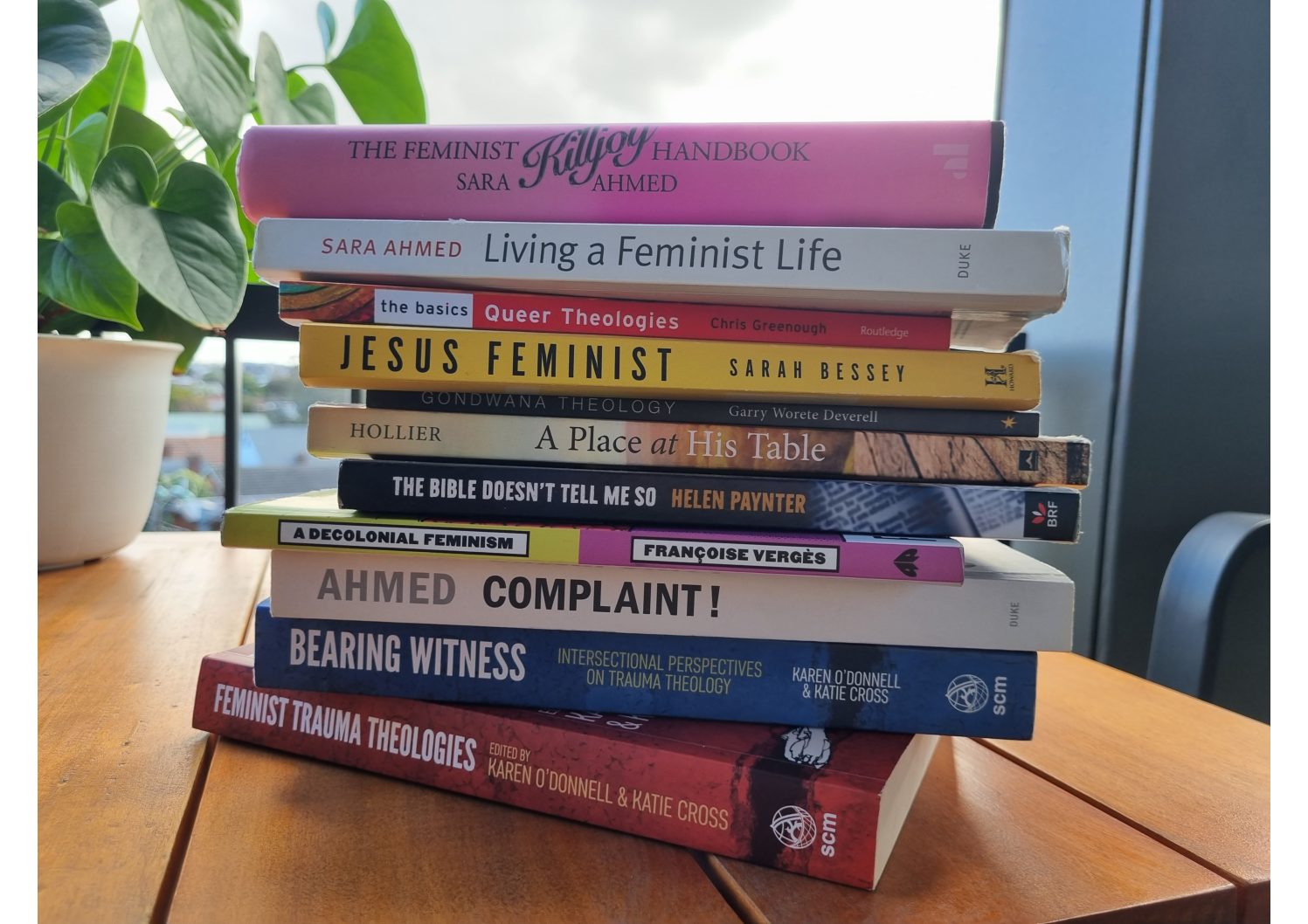Today’s blog post comes from Professor Esther McIntosh. She recently completed, with Dr Sharon Jagger, a two-year project exploring chaplaincy support for trans and non-binary staff and students at Anglican foundation universities, which is the focus of this blog. The project received financial support from the Church Universities Fund and ethical approval from York St John University.
Despite gender reassignment being named as a protected characteristic under the UK’s 2010 Equality Act, access to healthcare for trans folk is far from equal and the focus of mainstream media is not often positive or inclusive of the trans community. In 2020, an Independent Press Standards Organisation (IPSO) report found that stories focussed on trans ‘issues’ increased by 400% between 2009 and 2019. Increased visibility and awareness of a minority group is not necessarily problematic and can improve representation and awareness; however, if the tone of the coverage is negative and not representative of the people it claims to be about, it is harmful. IPSO notes in its report that there has been some ‘increased hostility’ and ‘concerns relating to freedom of expression’, while research by Paul Baker for Mermaids, one of the UK’s leading LGBTQ+ charities, found a substantial rise in media reporting referring to trans folk as ‘demanding or aggressive’ alongside ‘an explosion in media stories relating to children and gender issues’ some of which is ‘misleading, ill-informed and even, at times, cruel’, whilst failing to engage with trans folk themselves. Mermaids CEO, Susie Green states: ‘One consistent issue we’ve found is that politicians, presenters, campaigners and influencers are eager to speak about trans and gender-questioning children without listening to them first’. Furthermore, attempts to reform the UK’s 2004 Gender Recognition Act and to introduce self-identification have received targeted opposition from self-named ‘gender critical’ feminists.
Trans Folk and the Church of England
For trans people of faith, there is a potential double jeopardy. In addition to misrepresentation by mainstream media, the Church of England has been similarly guilty of writing about trans folk without consulting them. The 2003 document Some Issues in Human Sexuality contained a consideration of ‘transsexualism’, made use of the binary terminology of ‘male’ and ‘female’ as found in the biblical text, and reached its conclusions surrounding identity and sexuality without consulting any trans folk. Fifteen years later, the Church of England eventually issued new guidance permitting clergy to mark gender transition using the Affirmation of Baptismal Faith. While priests who are trans – Rev. Dr Tina Beardsley, Rev. Sarah Jones and Rev Canon Dr Rachel Mann – were consulted in the process and the guidance does represent a step towards liturgical inclusion of trans folk, the House of Bishops rejected the request for a specific liturgy for gender transition.[1] At present, the Church of England is nearing the end of a multiyear project entitled ‘Living in Love and Faith’ (LLF). On the one hand, the project has commendably sought out a range of participants including those who are trans, non-binary and intersex to share their stories; on the other hand, the 2020 publication accompanying the project, whilst speaking of ‘learning from the mistakes of the past’ and promoting ‘a radical new Christian inclusion in the Church’ (pp. viii and vii), repeatedly fails to challenge the claim that the Bible teaches that marriage is between a man and a woman understood in binary, essentialist and heteropatriarchal terms. Admittedly, the purpose of the LLF resources at present is to invite discussion and understanding regarding different perspectives on marriage, gender and sexuality, and we wait to see what proposals will be presented at the General Synod in February 2023, but it has not been an entirely encouraging process thus far. Fifteen months after joining the co-ordinating group of the LLF project, Tina Beardsley’s optimism was exhausted and she resigned, citing, in the Church Times, marginalisation, power imbalances and the serious harms that are experienced by LGBTI+ people when gender and sexuality are held up for debate. Furthermore, earlier this year at the 2022 Lambeth conference,[2] same-sex unions were the main issue of contention leading to reaffirmation from the Archbishop of Canterbury, Justin Welby, of Lambeth I.10 (1998) which states that marriage is ‘between a man and a woman’ and that ‘homosexual practice’ is ‘incompatible with Scripture’; once again, despite claims that all ‘are loved by God’, LGBTQ+ folk have been left feeling hurt and rejected.
Hearing the Voices of Trans and Non-Binary Folk
Hence, the impetus for our project was three-fold. First, as academics we were increasingly encountering transitioning and gender fluid students, and while our university was trying to be inclusive, some staff were struggling with terminology and pronouns, and some IT systems were not as flexible as they needed to be (for example, producing class lists with birth names rather than preferred or chosen names). Secondly, as academics in a department of religion, we were well aware of the difficulties that can be faced by queer and trans students with faith. Third, as cis feminists we believe there is an urgent need to stand up for trans-inclusion and to combat transphobia (especially anti-trans rhetoric from ‘gender critical’ feminists). Furthermore, given the prevalence of stories and policies written about trans folk rather than with them, at the heart of our project was the aim to hear and centre trans and non-binary voices, and to raise visibility and awareness of gender variance on university campuses. In addition, it was a requirement of the funding body that the research should enhance the Anglican ethos of the university or the presence of chaplaincy at Anglican foundation universities, which seemed like an ideal opportunity for us to also explore the ways in which chaplains negotiate the apparent tension between the inclusive ethos of a university and the less than inclusive religious institution that they represent. As cisgendered researchers, we paid attention to the ethical guidance developed by Johnstone (2019) and Henrickson et al. (2020), consulted trans priests before submitting the proposal, and made sure that the final report was written in consultation with our participants.
Phase 1: We began by circulating an anonymous questionnaire and interviewing any staff or students who indicated a willingness to be interviewed, as well as interviewing fourteen chaplains at Anglican foundation universities and two prominent trans Priests.
Phase 2: We organised the provision of story boards on university campuses to raise the visibility and awareness of trans and non-binary folk. The story boards created an opportunity for students to share poems, narratives or comments about their identity.
Phase 3: The culmination of the project was the writing of a report with recommendations aimed at improving inclusion on university campuses. We sent a draft of the report to participants and then held workshop to ensure we had represented the participants accurately, and, further, to find out whether our participants thought that the recommendations, if followed, would improve inclusion. In order to keep the recommendations manageable, practical and effective, we combined an initial list of thirty into eight and worded each as a verb: something to do. In addition, in order to enhance accessibility, the final report is free to download from the Centre for Religion in Society website.
Recurring Themes
We encountered a number of recurring themes. Some participants wished to challenge the homogenising effect of the umbrella abbreviation ‘LGBTQ+’ on the grounds that not all LGBTQ+ groups are supportive of all genders, expressions and identities. Other participants talked of living in stealth – having a trans history that is not part of their current public identity – and the ways in which the constant fear of being outed has curtailed career and other lifestyle aspirations that carry the risk of exposure. Relatedly, the trans priests spoke of the emotional labour and exhausting sacrificial work involved in having a public trans identity, especially through the constant ‘flag waving’ required for trans needs to be heard. The chaplains we interviewed highlighted the concepts of marginality and inclusion. They noted that while they often support those who are at the margins in the university context, they also operate from the margins of the Church. Moreover, they hold inclusion to be a baseline for the role of a chaplain and, yet, they face tensions supporting both trans folk and those who are opposed to gender transition. We were not surprised to find trans folk reporting negative experiences and barriers to inclusion in higher education, but these negative experiences are often hidden by the prevalence of rainbow lanyards on university campuses that can be a cover for action. Nevertheless, chaplains are in a unique position to signpost staff and students of faith to inclusive churches, and to influence university policies and practices.[3]
Surprising Findings
One of the more surprising findings for us arose around our use of story boards; we encountered resistance from gatekeepers of university spaces when we sought to increase the visibility of trans and non-binary folk. In spite of the promotion of events for LGBT+ History Month and the general perception that campuses are safe spaces, gatekeepers argued that it would not be safe for trans and non-binary folk to post comments on story boards. We stressed that posting on the boards was voluntary and could be anonymous, and within days the boards were filled with revealing comments: some trans folk expressed the freedom that university had given them to be themselves and to celebrate their identity, others reflected on the impact of the negative media coverage and on distressing estrangement from family members. On the one hand, the use of the boards suggests that trans and non-binary folk welcomed the opportunity to share their stories and to increase visibility and awareness on campus. On the other hand, the resistance we encountered from university personnel shows that trans folk are perceived to be uniquely vulnerable and confirms that, while the effort to protect groups seen as vulnerable comes from a place of good intention, it has the effect of making those groups invisible, taking away their decision-making opportunities and thus reducing their agency. As Doris Andrea Dirks (2016) argues, vulnerability discourse ignores the resourcefulness of gender variant folk and may serve to maintain marginalisation. Other findings included the view that encouragement to announce pronouns, which is intended to be trans inclusive, can be a form of outing for those who are questioning their gender identity; while, the use of Anglican cathedrals for graduation ceremonies can be a source of discomfort for staff and students who are LGBTQ+.
Recommendations and Concluding Remarks
Our recommendations were positively received and endorsed by participants. Although aimed at chaplains and intended to improve inclusivity on university campuses, they are applicable for others working in education and for other educational institutions. The recommendations can be read in full in the report. In brief, the recommendations are as follows:
1. To Listen and to Share: the importance of listening to and consulting with trans folk regarding their experiences on campus, and raising visibility through sharing stories is vital.
2. To Learn: current use of language is changing and what is liberating for some may not be for others; there is no one answer or solution for inclusion, rather, continual learning is necessary.
3. To Develop Trans-Inclusive Theologies: there is a need to challenge dominant theologies and to work with trans folk of faith to develop trans-inclusive theologies (this recommendation to challenge dominant texts and theories may also be applicable to other disciplines, such as sociology, anthropology, film, literature and so on, if the mainstream theories are cis normative).
4. To Influence: those with access to senior leadership teams can request training on campuses to improve knowledge and awareness.
5. To Be Visible: the rainbow is useful, but sometimes trans and non-binary folk feel invisible, and it can be beneficial to use specific trans and non-binary colours and symbols.
6. To Be Accessible: staff and students need to know where to access support, but those in supporting roles also need to know when to step back from a fixing role.
7. To Collaborate: support staff can engage in useful dialogue, organise events and share expertise across staff and student networks.
8. To Resource: support staff should be able to direct LGBTQ+ folk to inclusive churches, policies and networks (trans-inclusive resourcing is also important for libraries and for teaching materials).
Endorsements for the report include:
Tina Beardsley – ‘I feel well listened to, understood, and insightfully interpreted back to myself. I warmly commend this report. Based on interviews with chaplains, staff and students the researchers explore the pivotal role that chaplaincies can play among a ‘team of allies’ of trans and non-binary staff and students’.
Michael Bonshor – ‘The authors of this ground-breaking and thought-provoking report have adopted a refreshingly inclusive approach to their project. Rather than hypothesising about what gender-diverse individuals may or may not need to empower them in academic settings, McIntosh and Jagger directly consulted trans and non-binary staff and students about their experiences of life in higher education. Constructive recommendations are based on the research evidence and have been developed in collaboration with the research participants. This should be required reading for anyone who teaches or works with trans and non-binary individuals in higher education’.
Ultimately, the research underpinning the report has revealed the need for trans-inclusive campuses, for trans-inclusive feminism and for trans-inclusive theology; in particular, it is vital that diversification engenders LGBTQ+ inclusion by centring and amplifying the voices and concerns of the marginalised and we hope that the report may help to achieve this.
Works Cited
The Archbishops’ Council, 2020. Living in Love and Faith. London: Church House Publishing.
Dirks, D.A., 2016. Transgender People at Four Big Ten Campuses: A Policy Discourse Analysis. Review of Higher Education,39(3), 371-393.
Dowd, C. and Beardsley, C. with Tanis, J., 2018. Transfaith: A Transgender Pastoral Resource. London: Darton, Longman and Todd.
Henrickson, M.; Giwa, S.; Hafford-Letchfield, T.; Cocker, C.; Mulé, N.J.; Schaub, J.; Baril, A. (2020). Research Ethics with Gender and Sexually Diverse Persons. International Journal of Environmental Research and Public Health, 17(18), 6615 https://doi.org/10.3390/ijerph17186615
Johnston, M. S., 2018. Politics and tensions of doing transgender research: Lessons learned by a straight-white-cisgender man. In: Kleinknecht, S.; van den Scott, L. J. and Sanders, C. B. (eds), The Craft of Qualitative Research: A Handbook. Toronto: Canadian Scholars’ Press, pp. 85-91.
A Working Party of the House of Bishops, 2003. Some Issues in Human Sexuality: A Guide to the Debate. London: Church House Publishing.
[1] By contrast, in 2018, Chris Dowd and Tina Beardsley published Transfaith in which they have written liturgies for trans and gender variant folk, see pp. 178-200.
[2] Lambeth is a decennial conference for bishops from across the global Anglican communion
[3] Chaplains sit on a variety of university committees and have easy access to senior leadership teams and vice chancellors.

Professor Esther McIntosh is professor of feminist theology and ethics at York St John University, and currently serves on the editorial board of Brill’s book series ‘Political and Public Theologies’, as well as on the Executive Board of the Global Network for Public Theology. Her work is interdisciplinary and underpinned by a concern for gender justice. Her most recent publications include ‘The Persistence of White Christian Patriarchy in a Time of Right-Wing Populism’; ‘Blurring the Borders: Christian Women Negotiating Off- and Online Spaces of Feminism and Misogyny’; and ‘Gender in Religion, Religion in Society: The Agency and Identity of Christian Women’.






